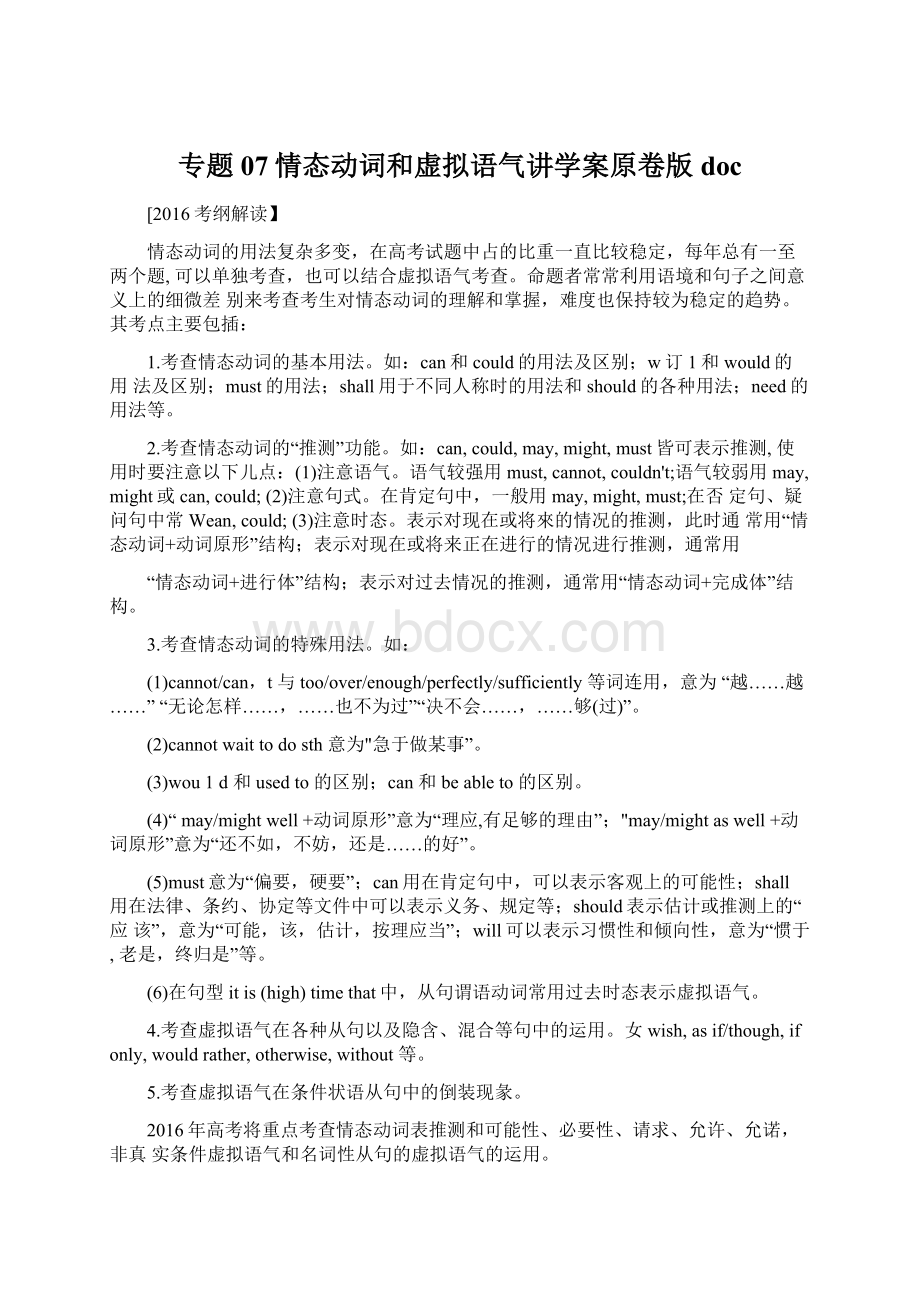专题07情态动词和虚拟语气讲学案原卷版docWord格式文档下载.docx
《专题07情态动词和虚拟语气讲学案原卷版docWord格式文档下载.docx》由会员分享,可在线阅读,更多相关《专题07情态动词和虚拟语气讲学案原卷版docWord格式文档下载.docx(12页珍藏版)》请在冰豆网上搜索。

may/mightaswell+动词原形”意为“还不如,不妨,还是……的好”。
(5)must意为“偏要,硬要”;
can用在肯定句中,可以表示客观上的可能性;
shall用在法律、条约、协定等文件中可以表示义务、规定等;
should表示估计或推测上的“应该”,意为“可能,该,估计,按理应当”;
will可以表示习惯性和倾向性,意为“惯于,老是,终归是”等。
(6)在句型itis(high)timethat中,从句谓语动词常用过去时态表示虚拟语气。
4.考查虚拟语气在各种从句以及隐含、混合等句中的运用。
女wish,asif/though,ifonly,wouldrather,otherwise,without等。
5.考查虚拟语气在条件状语从句中的倒装现彖。
2016年高考将重点考查情态动词表推测和可能性、必要性、请求、允许、允诺,非真实条件虚拟语气和名词性从句的虚拟语气的运用。
【重点知识梳理】
第一部分、情态动词
一xcan/could与beableto
1.can/could用来表示“一般能力”;
beableto有多种时态,且用来表示在特定条件下的“具体能力如:
Mygrandmaisoverseventy,butshecanstillreadwithoutglasses.
Theywillbeabletotellyouthenewssoon.
HewasabletofleeEuropebeforethewarbrokeout.
2.表示允许可用can或could,与may/might意义接近。
could可用于现在时,只是语
气更加委婉、客气,回答时则一般耍用can而不用couldo
—CouldIhavethetelevisionon?
一Yes,youcan./No,youcan'
t.
二may与might
1.表示允许,意为"
可以,许可”,用法基本上同can与couldo如:
MayIuseyourbicycle?
2.表示可能性,意为“也许,可能如:
Accordingtotheweatherforecast,itmayraintomorrow.
3.may可以放在句首,表示祝愿。
Maygoodluckbeyours!
三.must与haveto
1.must用來表示说话人的主观看法;
haveto表示客观的需要,强调外界压力,不得已而为之。
如:
Hesaidthattheymustworkhard。
他说他们必须努力工作。
(主观上要做这件事)
Mybrotherwasill,so1hadtocallthedoctorinthemiddleofthenight.
我弟弟生病了,我只得半夜里把医生请來。
(客观上需要做这件事)
2.表示“不必”,须用don'
thaveto或needn'
t。
must的否定式表示“禁止,绝对不可”。
Youdonrthavetotellhimaboutit.
你不必告诉他那件事。
Youmustn'
ttellhimabouti匸
你绝不能告诉他那件事。
一Mustwedoitnow?
我们必须现在做吗?
—No,youneedn'
t・
不,你们不必。
四、shall
1.用于第一、第三人称的疑问句中,用来征求对方的意见或请求指示。
Whatshallhedonext?
他下一步干什么呢?
2.用于第二、第三人称的陈述句中,表示说话人的意愿,有“命令、警告、允诺、威胁、强制"
等意思。
Heshallstayinbed.
他必须躺在床上。
Youshallhaveitbacknextweek.
下周一定还你。
Hesayshewon'
tgo,butIsayheshall.
他说他不去,但我说他必须去。
五、will与would
1.will用于各种人称,表示“意志、意愿”或“决心”等。
Ifyouwillkeepyourwatchhalfanhourslow,itishardlysurprisingthatyouarelateforyourappointments.
如果你想要让你的表慢半个小时,你约会时迟到就不足为怪了。
2.will表示习惯性的动作,有“总是,惯于”的含义。
AnEnglishmanwillusuallyshowyouthewayinthestreet.
英国人通常是会在街上给你指路的。
3.would可表示过去反复发生的动作。
女山
OnSundayshewouldgetupearlyandgofishing.星期天他总是早起去钓鱼。
六、should与oughtto
1.should表示“建议,域“劝告匕有“应该”之意。
Youshouldlearnfromeachother.
2.oughtto表示根据某种义务或必要“应当"
做某事。
Everyoneoughttoobeythetrafficregulations.
3.should和oughtto也用來表示推测,意为“想必会"
。
—WhencanIcomeforthephotos?
1needthemtomorrowafternoon.
—Theyshouldbereadyby1200.
七、情态动词表示推测
1.can用于肯定句屮表示客观的可能性,意为“有时会用于疑问句屮可以表示推测,意为“可能"
,有时表示一种惊讶的语气;
用于否定句中也可以表示推测,cant意为“不可能”,语气很强烈。
ItisusuallywarminmyhometowninMarch,butitcanberathercoldsometimes.
我的家乡在三月份通常很暖和,但有时候也会相当冷。
Mr.Bushisontimeforeverything.Howcanitbethathewaslateforthemeeting?
布什先生做什么事情都很准时,他怎么可能开会迟到呢?
—Let'
svisitTomtogether,Stephen.
—There'
snoneedtodoso.Hecan'
tbeathome,becauseIsawhimboardtheflighttoBeijingthismorning.
Stephen,咱们一起拜访汤姆吧。
——没必耍这样做。
他一定不在家,因为今天早晨我看见他登上了飞往北京的航班。
2.may/might用于肯定句中可以用来表示不十分肯定的推测,意为“有可能”;
用于否定句中也可以表示推测,maynot意为“可能不"
,表示一种不太确定的语气。
Thetrafficisheavythesedays.Imightarriveabitlate,socouldyousavemeaplace?
这些天交通很繁忙,我可能会来晚一点,请你帮我保留个位置好吗?
3.must表示推测时只能用于肯定句中,意为“一定,必定”,表示十分肯定的语气(在疑问句屮或否定句屮要用can/could)o
—It'
stheoffice!
Soyoumustknoweatingisnotallowedhere.
——Oh,sorry.
这是办公室!
所以你一定知道这里不许吃东西。
4.should用来表示推测时意为“应该”,即含有“按道理来说应当如此“的意思。
Thereshouldn'
tbeanydifficultyaboutpassingtheroadtestsinceyouhavepracticedalotinthedrivingschool.
因为你在驾校训练了这么多,通过路考应该没什么困难。
八、"
情态动词+havedone99结构
1.should/oughtto+havedone,表示“过去本应该做而(实际)没有做的事情”,含有责备
或遗憾的语气,意为"
本应该"
其否定形式为"
shouldnot/oughtnottohave+done”,表
示某种行为本不该发生但实际上发生了。
Ishouldn'
thavewatchedthatmovie—it'
llgivemehorribledreams.
我本不应该看那部电影一一它会令我做噩梦。
Yououghttohavecometothepartyyesterday,butwhydidn'
tyoucome?
咋天你本来应该参加聚会的,可是你为什么不来?
2.must+havedone,用于肯定句,表示"
过去一定做过某事”,表示一种很有把握的推测。
注意,对过去发生的情况的否定推测常用^can'
t/couldn'
t+havedone"
表示。
—YeShiwenwontwogoldmedalsinLondonOlympicGames.
—Shemusthavegonethroughtough(raining.
——叶诗文在伦敦奥运会获得了两枚金牌。
——她肯定受到严格的训练。
—DoyouknowwhereDavidis?
Icouldn'
tfindhimanywhere.
—Well.Hecan'
thavegonefar—hiscoat'
sstillhere.
——你知道大卫在哪里吗?
我到处找不到他。
——大卫的上衣还在这里,因此他肯定没走远。
3.needn'
t+havedone,表示“过去没有必要做某事,但实际上做了某事”。
Markneedn'
thavehurried.Afterdrivingattopspeed,hearrivedhalfanhourearly.
马克本没必耍那么匆忙。
他以最快速度开车,结果早到了半个小时。
4.may/might+havedone,表示对过去情况的一种不太有把握的可能性的推测,表示“可能已做了某事……”,否定句表示“可能还没有……雹
Sorry,I'
mlate.Imighthaveturnedoffthealarmclockandgonebacktosleepagain.
对不起,我迟到了。
我可能把闹钟关掉后又睡着了。
5.could+havedone表示"
过去本来"
J以做某事,但实际上没有做”;
can/could+havedone表示“过去可能做了某件事覽
Icouldhavesavedthepoorrabbit,butIdidn'
thavetherightdrugswithmeatthatmoment.
我本来可以拯救那只可怜的兔子的,可是我当时没有合适的药品。
第二部分、虚拟语气
一、虚拟语气在虚拟条件句中的用法
虚
拟情况
从句谓
语
主句谓语
例句
与
现在事
实
相反
过去式
(be用
were)
would/should/could/mig
ht
do
Ifhewerehere,hemightbeabletohelp.
Whatwouldyoudoifyouwereinhis
place?
过去事
实相反
had
done
would/should/could/might
havedone
IfIhadstartedalittleearlier,Iwouldhavecaughtthetrain.
IcouldhavedoneitbetterifIhadbeenmorecareful.
将來事
wereto
do/
should
IfIweretodoit,Iwoulddoitinadifferentway.
IwouldcertainlygoifIhadtime・
1.在具体运用川,条件从句川有时可省略讦而采用倒装结构。
Haditnotbeenforyourhelp,wewouldn'
thaveachievedsomuch.
2.介词without/butfor^连词but、副词otherwise常用来表示某种假设条件。
Iwouldn'
thavemadesuchrapidprogresswithoutyourhelp.
3.有吋候从句动作和主句动作发生的吋间不-•致,这吋谓语动词的形式要根据各自的时间来调整。
Iftheweatherhadbeenmorefavourable,thecropswouldbegrowingstillbetter.
二、Should+动词原形”表示的虚拟语气
这一类型常见词有"
一坚持(insist)、二命令(order,command)三建议(advise,suggest,propose)四要求(request,require,demand,desire)”。
以上词及其派生名词所接的名词性从句都使用“(should+)动词原形”的虚拟语气。
%1Jane'
spalefacesuggestedthatshewasill,andhermothersuggestedthatshe(should)haveamedicalexamination.
简苍白的脸色表明她病了,她母亲建议她去检查身体。
%1Sheinsistedthatthemanhadstolenhercarandthathe(should)besenttoprison.
她坚持说那个男人偷了她的车,并坚决要求他坐牢。
三、特殊句式中的虚拟语气
Ifonly/Ifs(high)time(that)...
wish/wouldrather/asif等固定句式要求用相应的虚拟语气表达形式。
%1IwishIcouldfly.
真希望我能飞。
%1Iwouldratheryoucametomorrow.
我宁愿你明天來。
%1IfonlyIhadtakenyouradvice!
要是听从了你的建议该多好啊!
【高频考点突破】
考点一、考查情态动词
例1.[2015•北京】29.—Can'
tyoustayalittlelonger?
一It'
sgettinglate.Ireallygonow,Mydaughterishomealone.
A.mayB.canC.mustD.dare
[变式探究】
(2014北京卷)27.Ihaveawordwithyou?
Itworfttakelong.
A.CanB.Must
C.ShallD.Should
考点二、考查情态动词的用法
例2..[2015•天津】7.IhaveworriedbeforeIcametothenewschool,formyclassmateshereareveryfriendlytome.
A.mightn,tB.mustrftC.needrftD.couldn51
【变式探究】
(2014安徽卷)30.Peoplearerecyclingmanythingswhichtheyaway
inthepast.
A.hadthrownB.willbethrowing
C・werethrowingD.wouldhavethrown
考点三、考查虚拟语气
例3.[2015•重庆】7.Withouthiswartimeexperiences,Hemingwayhisfamousnovel
AFarewelltoArms.
A.didn'
twriteB.hadn^twritten
C.wouldn'
twriteD・wouldn'
thavewritten
(2014北京卷)34.Webackinthehotelnow讦youdidn'
tlose
themap・
A.areB.were
C.willbeD.wouldbe
【经典考题精析】
1.(2015-北京,29)一an'
sgettinglate.Ireallygonow.Mydaughterishomealone・
2.(2015•浙江,4)Itwassonoisythatwenothearourselvesspeak.
3.(2015-重庆,12)YoubeCarol.Youhaven'
tchangedabitafteralltheseyears.
4.(2015-陕西,21)Youfeelallthetrainingawasteoftime,butFmahundred
percentsurelateryou'
11begratefulyoudidit.
5.(2015-四川,2)Youbecarefulwiththecamera.ltcosts!
6.(2015-福建,27)—Sorry,Mum!
Ifailedthejobinterviewagain.
一Oh,it'
stoobad.Youhavemadefullpreparations.
7.(2015•天津,7)1haveworriedbeforeIcametothenewschool,formy
classmateshereareveryfriendlytome.
8.(2015-北京,34)IfI(see)itwithmyowneyes,Iwouldn'
thavebelievedit.
9.(2015•重庆,7)Withouthiswartimeexperiences,Hemingway(write)his
famousnovelAFarewelltoAnns・
10.(2015-陕西,23)Ellenisafantasticdancer.IwishI(dance)aswellasher.
11.(2015-天津,13)1wishI(be)atmysister'
sweddinglastTuesday,butIwasona
businesstripinNewYorkthen.
12.(2015-安徽,32)Itisluckywebookedaroom,orwe(have)nowheretostay
now・
1.(2014浙江卷)16.Theywereabroadduringthemonthswhenwewerecarryingoutthe
investigation,ortheytoourhelp・
A.wouldhavecomeB.couldcomeC.havecomeD.hadcome
2・(2014重庆卷)3.Fveorderedsomepizza,soweworryaboutcookingwhen
wegethometired.
A.can^B.darenotC.needrftD.maymot
3.(2014重庆卷)13・ItwasJohnwhobrokethewindow.WhyareyoutalkingtomeasifI
it?
A.haddoneB.havedoneC・diclD.amdoing
4.(2014大纲卷)30.AlthoughyoufindbargainsinLondon,让'
snotgenerallyacheap
placetoshop・
A.shouldB・needC.mustD.can
5.(2014福建卷)32.nomodemtelecommunications,wewouldhavetowaitforweeks
togetnewsfromaroundtheworld・
A.WerethereB.Hadthereb